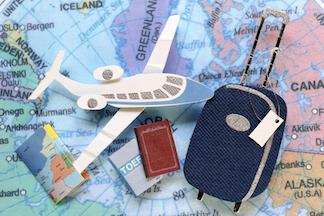Do your research
Language, culture, religion, beliefs – each EU country is wonderfully unique, with its own way of doing things. A little online research can help you to gain an understanding of the general customs and etiquette of your target country and prepare you for life abroad. The EURES services can help you to find your first EURES job abroad, and the EURES website offers practical tips for living and working abroad in each of the participating countries. The Erasmus+ programme is also a great way to find out about education, training, youth and sport opportunities in the EU. There are still going to be mistakes and funny misunderstandings (and that’s okay – no one expects you to arrive as an expert!), but equipping yourself with the basic knowledge should allow you to quickly adjust to your new surroundings and feel like you belong there.
Learn the language
Learning the country’s native language might seem like a daunting task – or maybe not necessary if you’re only going to be there for a short time – but it can also bring a whole host of benefits, particularly if you’re working closely with other people. You don’t have to be fluent, but having a good grasp of the basics will make communicating easier and may even open up new opportunities both socially and professionally.
Swallow your fear
It’s natural to feel nervous about starting a new job, apprenticeship or course, particularly when you’re doing so in the unfamiliar environment of another country. You’re not alone! If you’re at university, there are likely to be other people on your course in the same situation and also support available through the university itself. Equally, if you’re in a workplace, some of your colleagues may have been in your position in the past and can share the benefit of their experience.
Make the most of your opportunities
A new environment means new opportunities, so take advantage of them! Learn from the talented people around you, ask for advice when you need to and seek out chances to further your career. Make use of the careers facilities at your university or the connections available through your workplace. And never forget to network. You never know when the person you strike up a conversation with in the canteen could turn out to be a future employer.
Pack smartly
Think about where you are going and what you’ll need carefully. If you’re moving to Spain, you probably don’t need your favourite woolly socks. Equally, if you’re moving to the UK then it’s a good idea to take an umbrella!
What familiar home comforts can you not live without? Don’t rely on being able to pick them up from a local supermarket – some products will be unique to your home country, so make sure you bring them with you.
Get your finances in order
If you’re going to be abroad for more than a few months, it’s probably worth setting up a new bank account in your target country so that you have easy access to funds. Or if that’s not an option, it’s wise to tell your bank in your home country that you’re moving abroad so that they don’t think your account details have been stolen!
And most importantly of all… enjoy yourself!
Yes, you’re in another EU country to work, train or study, but that doesn’t mean you can’t enjoy yourself. Each country has its own unique sights to see, history to absorb and culture to embrace. Put aside some time to take all this in and ensure you return home with no regrets.
Hopefully this article’s given you a good starting point for your overseas adventures – all that’s left to do now is wish you luck!
Related links:
Read more:
Working and living conditions in EURES countries
EURES Jobs Database
EURES services for employers
EURES Events Calendar
Upcoming Online Events
EURES on Facebook
EURES on Twitter
EURES on LinkedIn
EURES on Google+
Details
- Publication date
- 28 March 2017
- Authors
- European Labour Authority | Directorate-General for Employment, Social Affairs and Inclusion
- Topics
- EU toolbox for mobility
- Hints and tips
- Social media
- Youth
- Related section(s)
- Sector
- Accomodation and food service activities
- Activities of extraterritorial organisations and bodies
- Activities of households as employers, undifferentiated goods- and services
- Administrative and support service activities
- Agriculture, forestry and fishing
- Arts, entertainment and recreation
- Construction
- Education
- Electricity, gas, steam and air conditioning supply
- Financial and insurance activities
- Human health and social work activities
- Information and communication
- Manufacturing
- Mining and quarrying
- Other service activities
- Professional, scientific and technical activities
- Public administration and defence; compulsory social security
- Real estate activities
- Transportation and storage
- Water supply, sewerage, waste management and remediation activities
- Wholesale and retail trade; repair of motor vehicles and motorcycles
